

iPod Owners: You're Suing Apple. If you're one of the millions who purchased an iPod between Sept. 12, 2006, and March 31, 2009, you might be in for a surprising email.
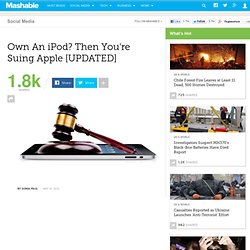
It states that you're being enlisted in a class-action lawsuit against Apple — though you do have the right to recuse yourself. The class-action lawsuit was originally filed by a customer in January 2005 and was ignited by the creation of the music service Harmony. Back in 2004, the company RealNetworks created Harmony as a digital rights management (DRM) translation service. It allowed users to play songs downloaded from the RealPlayer music store on Apple's iPod. UPDATE 1-US Justice Dept may sue Apple on e-book pricing. Apple's Next Privacy Scandal: Apps That Steal Your Photos. It's only been a few weeks since the last major iOS privacy scandal.
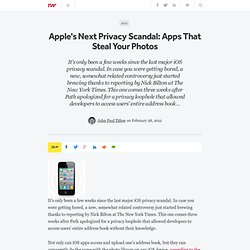
In case you were getting bored, a new, somewhat related controversy just started brewing thanks to reporting by Nick Bilton at The New York Times. This one comes three weeks after Path apologized for a privacy loophole that allowed developers to access users' entire address book without their knowledge. Not only can iOS apps access and upload one's address book, but they can apparently do the same with the photo library on any iOS device, according to the Times. iPhone Security Flaw Gives Developers Access to Photos [REPORT] In Apple's third major privacy flaw revelation this month, app developers have told The New York Times that they can easily access private photos on your iPhone, iPad or iPod touch.
![iPhone Security Flaw Gives Developers Access to Photos [REPORT]](http://cdn.pearltrees.com/s/pic/th/iphone-security-developers-24127767)
App developers told the publication that after you download an app, it can easily copy your entire photo library without telling you. Apple doesn't block app developers from copying photos, but the company screens all the apps that appear in its App Store. Apple reps could not be reached for comment on the report. Developers gain access to your photo library when an app asks to use your location data with a pop-up messages asking for “access to location information in photos and videos," according to the report. The photos and videos are saved along with information about where they were taken. The report comes after reports surfaced that app developers had access to address book information without notifying users. Image courtesy of iStockphoto, DNY59. Apple: Access to Contacts Will Require Explicit Permission.
Apple said Wednesday that iOS apps accessing users' contact lists will require explicit permission, following a week of accusations that a number of iPhone apps were storing data on their servers.
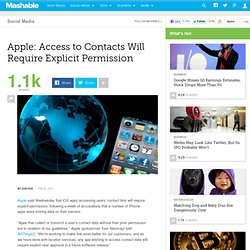
“Apps that collect or transmit a user’s contact data without their prior permission are in violation of our guidelines,” Apple spokesman Tom Neumayr told AllThingsD. “We’re working to make this even better for our customers, and as we have done with location services, any app wishing to access contact data will require explicit user approval in a future software release.” The recent controversy began after an OS X developer discovered Path had been storing users' contact lists. While Path CEO Dave Morin quickly apologized, other apps such as Twitter, Foursquare and Yelp came forward to state they planned to change their mobile permission settings. Apple PR’s dirty little secret. Antennagate: iPhone 4 Customers Win Class Action Lawsuit. A class-action suit against Apple for iPhone 4 antenna reception problems has reached a settlement in the "antennagate" case, with a preliminary approval granting U.S. residents who bought the phone either $15 in cash or a bumper case from Apple.
According to CNET, the preliminary approval was made on Friday afternoon in a settlement of 18 consolidated lawsuits. The combined suit alleged that Apple was "misrepresenting and concealing material information in the marketing, advertising, sale and servicing of its iPhone 4 — particularly as it relates to the quality of the mobile phone antenna and reception and related software. " More information is forthcoming about the class action suit, which has its own website to handle claims. iPhone4settlement.com is not operational yet, but when it goes online, those who bought an iPhone 4 can find information about how to claim their $15 or iPhone Bumper from Apple. Apple Asks Outside Group to Inspect Factories. Fair Labor Auditor Says Apple Factories In China Better Than Most. Hey, at least it's not a garment factory.
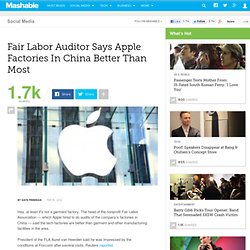
The head of the nonprofit Fair Labor Association — which Apple hired to do audits of the company's factories in China — said the tech factories are better than garment and other manufacturing facilities in the area. President of the FLA Auret van Heerden said he was impressed by the conditions at Foxconn after several visits, Reuters reported. Audits of the eight factories Apple uses in China began on Monday starting with Foxconn Technology Group. Apple expedited the FLA's audit after mounting criticism of working conditions at its factories. The results of the audit will be made public in March on the FLA's website. Foxconn is the most notorious of these factories for past explosions, worker suicides and strenuous hours of repetitive work. The FLA will hold each factory to "140 specific compliance benchmarks" listed in its Code of Conduct. Apple Supplier to Raise Salaries. INCONVENIENT TRUTH: Your iPhone Was Built, In Part, By 13 Year-Olds Working 16 Hours A Day For $75 A Week.
The Cost of Doing Business: Foxconn, Apple, and the Fate of the Modern Worker. "Out of the crooked timber of humanity, no straight thing was ever made.
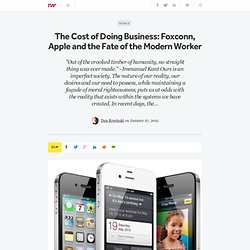
" - Immanuel Kant Ours is an imperfect society. The nature of our reality, our desires and our need to possess, while maintaining a façade of moral righteousness, puts us at odds with the reality that exists within the systems we have created. In recent days, the character of our era of consumerism has been put in question. We want what is new, shiny, fashionable. We want it now. The Conditions at Foxconn. Foxconn and Apple Respond to ABC Report. Although it didn't unearth any atrocities in the factories of Foxconn - the Chinese company that manufactures goods for several electronic giants, including Apple - ABC's recent report did raise a lot of questions about the conditions there.
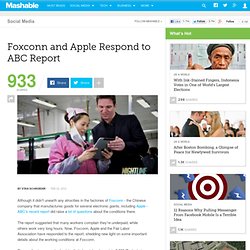
The report suggested that many workers complain they're underpaid, while others work very long hours. Now, Foxconn, Apple and the Fair Labor Association have responded to the report, shedding new light on some important details about the working conditions at Foxconn. Apple CEO Tim Cook Responds to Factory Condition Mistreatment.
Apple CEO Tim Cook has sent an email to employees that addresses allegations surrounding work conditions at its supplies factories, noting that the company "never turns a blind eye to problems in our supply chain.
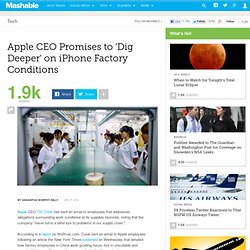
" According to a report by 9to5mac.com, Cook sent an email to Apple employees following an article the New York Times published on Wednesday that detailed how factory employees in China work grueling hours, live in unsuitable and crowded living conditions and have even died in facility explosions. "Unfortunately, some people are questioning Apple’s values today, and I’d like to address this with you directly," Cook wrote. "We care about every worker in our worldwide supply chain.
Any accident is deeply troubling, and any issue with working conditions is cause for concern. Apple Stock's Lofty Heights, in Context. 5:26 p.m. | Updated to reflect Thursday’s closing stock prices.
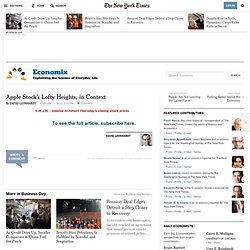
After Labor Criticism, Apple Releases List of Suppliers for First Time. Apple released an extensive list of its suppliers for the first time ever on Friday along with its annual report on labor conditions at contract manufacturers around the world. The move reflects an apparent sensitivity to increased public criticism of the company’s level of accountability and transparency regarding where and how its gadgets are manufactured. The data depicts a company that is moving toward better working conditions, but that still makes many of its high-cost products in environments that would likely be untenable in many of the places where those gadgets are used. For example, the portion of suppliers in compliance with Apple’s regulations on working hours climbed to 38% in 2011 from 32% the year before. But a success rate of less than 40% would be considered a failure in, say, Cupertino — especially with the maximum manufacturing workweek set by Apple at 60 hours.
Explosions fueled by aluminum particles injured employees at two plants in 2011, according to the report. Chinese Workers at a Foxconn Factory Threaten Mass Suicide. Electronics-manufacturing giant Foxconn, which saw 14 employees commit suicide at its Chinese plants in 2010, has come under renewed pressure after a group of workers reportedly threatened to jump from a building last week.
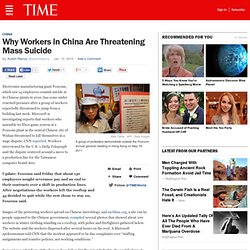
Microsoft is investigating reports that workers who assemble its Xbox game system at a Foxconn plant in the central Chinese city of Wuhan threatened to kill themselves in a wage dispute, CNN reported. Workers interviewed by the U.K.’s Daily Telegraph said the dispute centered around a move to a production line for the Taiwanese computer brand Acer.
Update: Foxconn said Friday that about 150 employees sought severance pay and an end to their contracts over a shift in production lines. After negotiations the workers left the rooftop and 45 decided to quit while the rest chose to stay on, Foxconn said. This American Life retracts Apple episode, says Daisey fabricated parts. Daisey (MikeDaisey.blogspot.com) The public radio show This American Life has retracted an entire storyline told by comedian and self-described Apple fanboy Mike Daisey that aired in early January after Daisey's translator said he made up significant details of the tale. In a press release, the show says the episode was the most popular in its history and was downloaded 888,000 times. The episode also sparked a petition for Apple to improve its working conditions that was signed by a quarter of a million people.
Daisey said in the 39-minute episode that he became curious about the conditions of Chinese factories where Apple products are made after he discovered photos of factory workers that were left onto his iPhone by mistake. He travelled to the factories in Shenzhen, China and interviewed workers there, who told him they endured terrible working conditions. So why didn't This American Life talk to Cathy Lee earlier, before they aired the episode? Mike Daisey Fights Back on Apple Story: 'I Will Not Go Silent'
Mike Daisey, the outspoken critic of Apple and its manufacturing partners in China, has responded on his website to the firestorm of criticism that erupted last week when it was revealed he had fabricated many of his most dramatic examples of oppressed workers. Daisey, who helped Public Radio International's This American Life adapt his one-man show, "The Agony and Ecstasy of Steve Jobs," into an hour-long radio documentary, wrote a post in which he says he stands by his apology but that he "will not go silent. " He says he'll make a "full accounting" of how he created his show, presumably revealing which details are true and which ones he took dramatic license with.
Daisey also had a few things to say to This American Life host Ira Glass, who retracted the show that was based on Daisey's play, then aired an hour-long episode Friday night that explained the retraction. Apple Hopes to Block First Android 4.0 Phone in U.S. Apple just sued Samsung in a California court over alleged patent infringement. The offending product, according to Apple: the Galaxy Nexus, the world's first phone to run Android 4.0 "Ice Cream Sandwich. " If successful in its lawsuit, Apple could block the phone from being sold in the U.S., Reuters reports. The story may sound familiar.